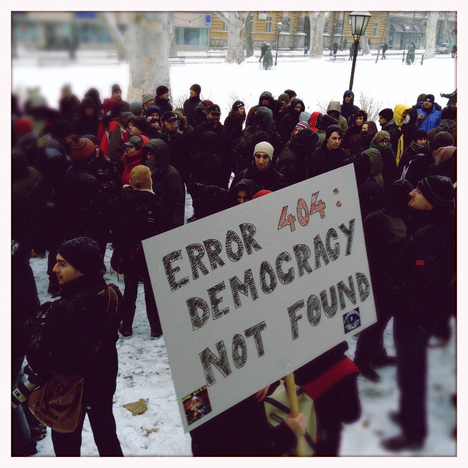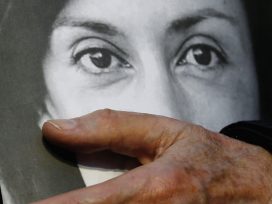The response of the Croatian media to the NSA spying affair ranged from sensationalism to informed analysis, which reflected Croatia’s stance toward the USA and its influence over domestic politics. The Snowden story was covered fairly intensively and public opinion was largely critical of the USA. The weak response of the Croatian government and the lack of any serious debate at the political level was ridiculed. Some connections were made to the historical experience of state surveillance but this soon degenerated into a typically Croatian quarrel between fascists and antifascists. On the left of the political spectrum and among Internet-literate circles there have been more serious debates about the surveillance of journalists by the state (Croatia has a track record here) and about the freedom of Internet.

Activist groups and journalists have tried to widen the debate on digital rights: here, an anti-ACTA demo in Zagreb, 11 February, 2012. Photo: Adi. Source:Flickr
Like everywhere else in Europe, the Paris attacks were broadly condemned, sparking a debate on the response that the EU should take. Rightwingers predictably called for greater surveillance powers and for closing borders while leftwingers were pro-immigration (in Croatia this is still not a public issue as such) and criticized an overtly liberal interpretation of the freedom of speech. Since Croatia is in a peculiar position among EU countries in not belonging to the Schengen space, the Paris attacks sparked a debate on the extension of the Schengen borders. There is serious concern about the proximity of Bosnia and every week there is a report on ISIS recruitment there. But, as with the issue of surveillance, there is a sense that our government is not really concerned with this issue.
The Croatian public sphere is so congested with domestic politics (presidential elections, oncoming parliamentary elections) that European data protection policy is not on the agenda. The reforms are commented on by data protection experts, the Internet community and hackers, however the general public is not really aware about what’s going on. Consumer rights are a fairly new concept in Croatia and discussed mostly in connection with telecommunications companies and banks; there is little talk about privacy as a consumer right. There is huge mistrust in political parties and their bias toward “big business”, and the discussion about consumer rights is very often part of this debate about corruption.
The debate on digital rights and encryption is limited to the digital elite, however it’s held openly. The wider public debate is still rudimentary, however. While there are activist groups and journalists trying to change this, “campaign” would be too big a word.







